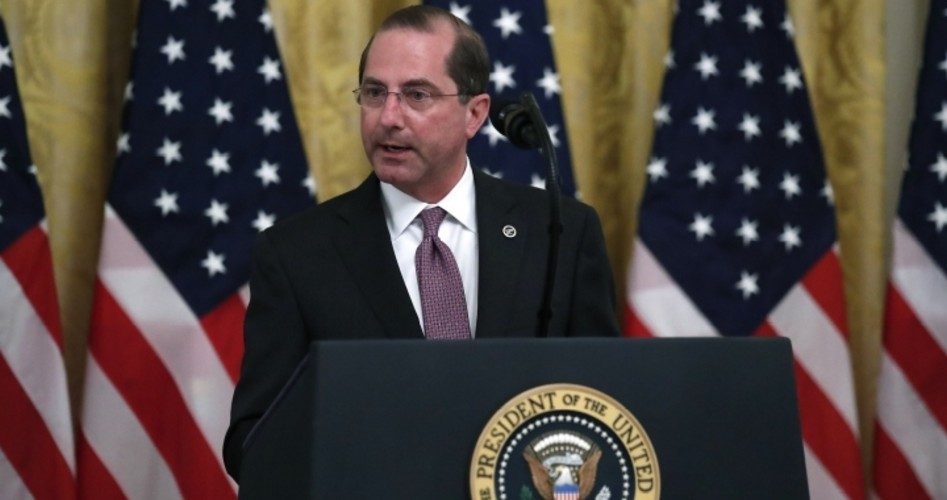
In an interview with host Jake Tapper on State of the Union on May 17, Health and Human Services Secretary Alex Azar (shown) said there has not been a spike in coronavirus cases in the states that are relaxing restrictions and reopening parts of their economies.
Azar was responding to a question from Tapper, who asked, “Let me ask you, this is intriguing to me because some states have been agressive with reopening despite warnings of dire consequences from health experts…. States like Georgia and Colorado began reopening weeks ago, and it seems at least so far that we have not seen a dramatic spike in new cases from those two states, Georgia and Colorado.”
Azar’s response was thorough:
Jake, I think your question is very insightful. We are seeing that in areas that are opening, we’re not seeing the spike in cases. We still see spikes in some areas that are, in fact, closed, very localized situations. And so this is going to be really important for us to watch the circumstances on the ground. With reopening, what’s the key to reopening? First, we need to have good surveillance. So we need to look for influenza-like illness and other respiratory disease. We’ve got a great surveillance system for that. We look for spikes and early indicators. We have adequate testing capacity. We need to make sure anybody who is symptomatic is tested and that we have adequate asymptomatic surveillance in areas of greatest burden. Senior living, congregate living situations like prisons or meat-packing facilities where people are close together. So we look for early indicators. Then we use the traditional public health tools to surge in there. We would test everybody there.… That’s where places like Georgia and Colorado, as they reopen, it’s these tools that allow us to be reopened, but do so in a safe way that lets the economy function but allows us to use the traditional tools of public health to move forward as we would with any other disease.
Azar also said that identifying and reporting new cases of the COVID-19 virus takes time. A key factor of the reopening process will be surveillance of flu-like symptoms in the population, analyzing hospital admissions data, as well as testing of asymptomatic individuals.
In another interview with moderator Margaret Brennan on Face the Nation the same day, Azar clarified Brennan’s summary of the situation: “So we don’t know the risk of reopening, in other words, just yet, but you are going to be monitoring it is what you’re saying?
Azar said, “We certainly … will be monitoring. But we’ve seen some initial instances of states like Georgia that have reopened, Florida that’s reopening, that we have not seen [a spike in cases]…. We think the tools are there. And it’s also important to remember, you know, this gets set up as a [supposed] health versus economy kind of conflict.”
“It’s actually health versus health,” Azar continued. “We … see suicidality. We see reduction in cardiac procedures, cancer screenings, pediatric vaccinations. There is … a very real health consequence to these shutdowns that must be balanced … as we try to reopen this economy and move forward.”
Photo: AP Images
Warren Mass has served The New American since its launch in 1985 in several capacities, including marketing, editing, and writing. Since retiring from the staff several years ago, he has been a regular contributor to the magazine. Warren writes from Texas and can be reached at [email protected].
Related article:
Fauci: New COVID-19 Outbreaks Could Come if We Reopen Too Fast




